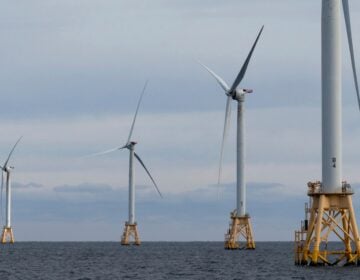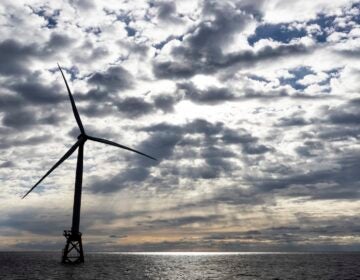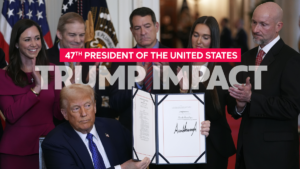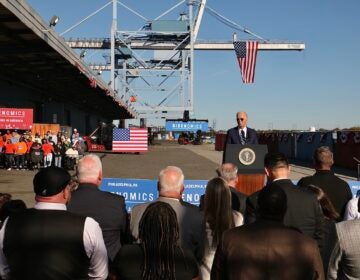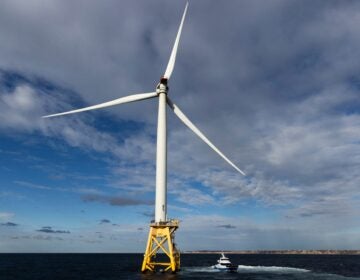‘Politically motivated’: US Wind criticizes Trump administration’s move to kill Delmarva offshore wind farm
The offshore wind farm’s construction plan was approved last year. But the federal government is pulling back on renewable energy projects.
Listen 1:05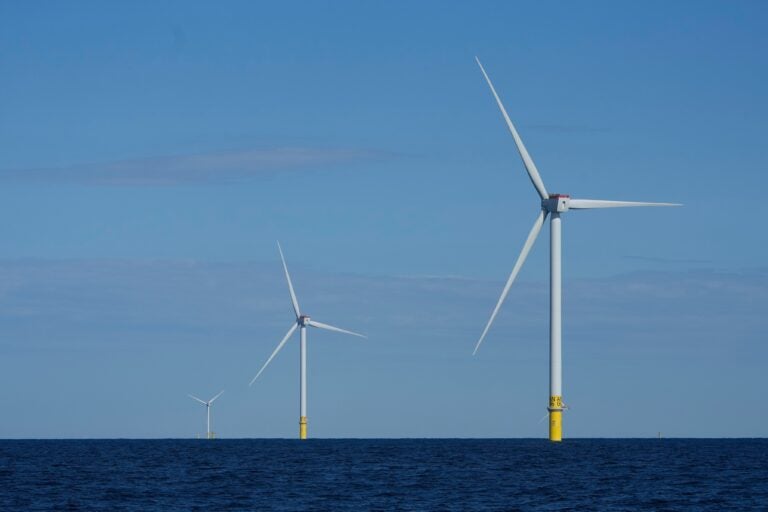
FILE - Wind turbines of South Fork Wind are seen off the coast of Block Island, R.I., Oct. 9, 2024. (AP Photo/Seth Wenig, File)
What are journalists missing from the state of Delaware? What would you most like WHYY News to cover? Let us know.
President Donald Trump’s administration has officially moved to kill the offshore energy project off the coast of the Delmarva Peninsula.
The court motion Friday by the Bureau of Ocean Energy Management and other government agencies says the Maryland District Court should vacate its prior approval of the Construction and Operations Plan (COP).
The federal action comes as the Trump administration continues its antipathy toward offshore wind projects and downplays the impact of climate change and the need to combat it.
US Wind, a Baltimore-based subsidiary of an Italian energy company, has plans for two projects that would provide Maryland with renewable power.
The first project, called MarWin, is an 80,000-acre wind farm 10.7 miles off the coast of Ocean City, Maryland, and Fenwick Island, Delaware. The controversial endeavor has been challenged in court by Ocean City and various associations and interest groups. There’s a separate lawsuit in Delaware.
Then-President Joe Biden’s administration approved the construction and operations plan for the first project, MarWin, in December. The plaintiffs opposing the project in Maryland argue that federal officials at the time coordinated to bypass transparency and shortcut the statutory and regulatory requirements to approve major offshore projects “as fast as possible.” The Delaware lawsuit against the U.S. Department of the Interior argues the US Wind project would harm tourism and the environment.
BOEM said Friday that authorization for US Wind to begin construction was faulty and that the bureau plans to re-review the information and issue a new verdict. The position largely aligns with the opponents’ assertions.
“BOEM has concluded that its prior analysis approving the COP failed to properly apply the factors and account for all the project’s potential impacts,” the agency argued. “That includes an underestimation of impacts to search and rescue operations within the project area and impacts to commercial fisheries that may not be sufficiently mitigated.”
BOEM asked the court to allow it to reconsider the earlier construction decision even if the court does not grant its request to vacate the construction plan approval.
US Wind ‘remains committed’ to 1,700-megawatt project
US Wind has called the administration’s moves “politically motivated.”
“Evidence of political pressure applied to the federal defendants’ decision makers includes public and … nonpublic communications by elected officials, including the president of the United States, the president’s political appointees, members of Congress, and opponents of offshore wind,” the company said in a counterclaim filed last month.
Nancy Sopko, US Wind vice president of external affairs, said in a statement the company remains undeterred by the government’s action.
“US Wind remains committed to building our 1,700-megawatt offshore wind project, one of the largest new electricity projects in the entire region,” Spoko said. “After many years of analysis, several federal agencies issued final permits to the project. We intend to vigorously defend those permits in federal court, and we are confident that the court will uphold their validity and prevent any adverse action against them.”
BOEM’s motion argues that if Maryland District Court Judge Stephanie Gallagher vacates the construction plan approval, whether or not the Biden administration appropriately issued the permits is irrelevant.
The permits for the project were initially defended by the federal agencies that granted the approvals before Trump was sworn into office in January.
BOEM has asked for a stay in the Delaware case until Judge Gallagher renders a decision in Maryland.
Kris Ohleth, director of the Special Initiative on Offshore Wind, a policy think tank that supports and advises offshore wind developers, said the government is using its anti-wind bias to kill renewable energy projects across the country.
“None of their conclusions have been based on science or actual findings, as opposed to what they’re actually doing, which is using political force, and again, bias against these projects,” she said.
Ohleth said the Trump administration is testing the legal bounds of the federal government in terms of rescinding permits that have gone through a fully vetted permitting process at the state and federal level.
BOEM declined to comment on the pending litigation. But U.S. Department of Energy Secretary Chris Wright recently commented on renewable energy projects and climate change during an event at the Council on Foreign Relations, a nonpartisan think tank.
Wright, a former Denver-based fracking executive, said offshore wind raises electricity prices. He also questioned the permitting process of the projects.
“If you do something fast and quickly, because we’re in a crisis, and it must happen, bad things happen,” he said. “Why are right whales dying, and what’s happened to our fish population?”
The National Oceanic and Atmospheric Administration refutes Wright’s claim that wind farms are killing whales. The government agency’s website said there are no known links between large whale deaths and ongoing offshore wind activities.
Wright also downplayed the effects of climate change.
“Climate change for impacting the quality of your life is not incredibly important,” he said. “In fact, if it wasn’t in the news and the media, you wouldn’t know it.”
Delaware’s connection to offshore wind project
The MarWin project would be capable of generating 300 megawatts of electricity and powering 92,000 Maryland homes.
Delaware has a $128 million agreement with US Wind for the two Delamarva offshore wind projects that was inked last year.
The project includes running power transmission cables from the wind farm constructed 3 miles offshore in the Atlantic Ocean to 3Rs Beach at Delaware Seashore State Park. The cables would run beneath Delaware-regulated wetlands, state waters and the Indian River Bay before connecting to a substation near a former power plant.
The Sussex County Council voted last year to reject US Wind’s permit application for the substation. The company’s subsidiary Renewable Development has appealed that decision.
The MarWin project has been controversial, with some Democratic lawmakers arguing it was vital to increase supply to the PJM Interconnection regional grid that Delaware depends on since most of its energy is produced by other states.
Gov. Matt Meyer signed legislation on June 30 that overturned the Sussex County substation denial.
This story was supported by a statehouse coverage grant from the Corporation for Public Broadcasting.

Get daily updates from WHYY News!
WHYY is your source for fact-based, in-depth journalism and information. As a nonprofit organization, we rely on financial support from readers like you. Please give today.



